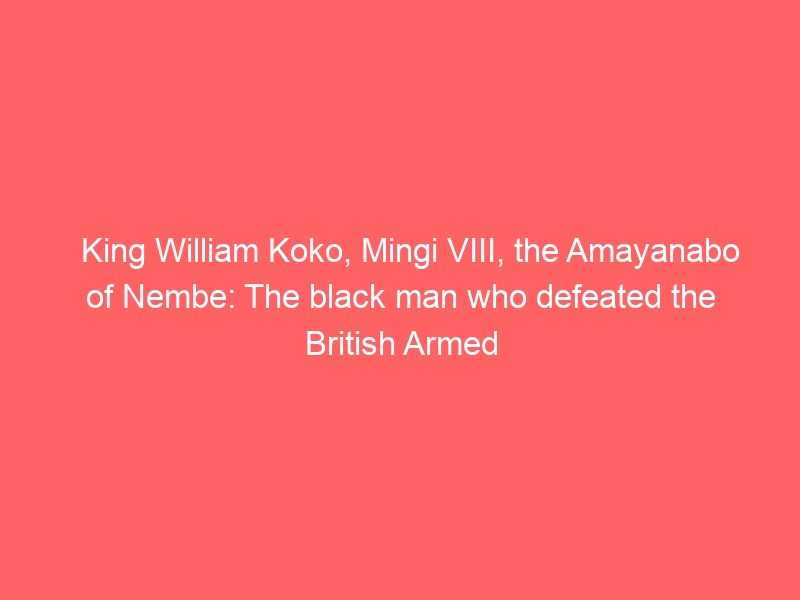By Minaibi Ogboye
King Frederick William Koko, Mingi VIII, Amayanabo of Nembe (1853–1898), known as King Koko or King William Koko, was the Amayanabo (King) of Great Nembe Kingdom(Nembe, Brass, Akassa, Okpoma) in the ancient Oil River Protectorate, now in Nembe and Brass Local Government Areas of Bayelsa State, South-South (Niger Delta Region) Nigeria.
Note: Nembe Kingdom and King Koko played a major role in 1914 amalgamation of Nigeria. Before the arrival of the colonial masters, Nembe Kingdom was like a state (Country) of it’s own; In 1884 the white men included it in the Oil Rivers Protectorate; in 1967 it became part of old Rivers State and in 1996 it was carved out of Rivers State to form Bayelsa State.
Koko’s Early Life
Koko was born in 1853 into the Mingi royal family of Nembe, an Ijaw ethnic group in the oil-rich Niger Delta Region of Nigeria, Africa’s most populous nation.
He was brave, intelligent, handsome and hard-working; his fishing skills and business sense had no rival within the Nembe Kingdom. He led Nembe to many wars as a warrior even before his ascension to the Mingi throne.
He was educated and spoke Nembe and English languages fluently.
Koko left the Nembe traditions and converted to Christianity and became a Sunday school teacher in the Church, which helped him to rise to power later because almost all the powerful chiefs and businessmen in Nembe Kingdom were Christians, they include – Spiff, Sambo, Cameroon etc.
Koko, the Amayanabo
In 1889, after the death of Amayanabo Ockiya, Koko, being a member of the royal family, and with the help of the leading powerful Christian chiefs, became the Amayanabo (King) of Nembe. However, there was at the same time a coparcenary king, the elderly Ebifa, who ruled at Bassambiri and was Commander-in-Chief until his death in 1894.
The Nembe Kingdom ruled by Mingi comprises of sub-kingdoms, they include Nembe main town (Ogolomabiri and Bassambiri), Akassa, Brass and Okpoma in form of a confederal state.
Koko Led Nembe To Prosperity
With the settlement of European traders on the coast, Nembe had engaged in trade with them, but it was poorer than its Bonny, Okrika and Kalabari neighbours.
Nembe was the centre of an important trade in palm oil, and it had refused to sign a treaty proposed by the British, opposing the Royal Niger Company’s aim of bringing all trade along the kingdom’s rivers into its own hands. By the 1890s, there was intense resentment of the Company’s treatment of the people of the today’s Niger delta and of its aggressive actions to exclude its competitors and to monopolize trade, denying the men of Nembe the access to markets which they had long enjoyed.
Nembe was the centre of an important trade in palm oil, and it had refused to sign a treaty proposed by the British, opposing the Royal Niger Company’s aim of bringing all trade along the kingdom’s rivers into its own hands. By the 1890s, there was intense resentment of the Company’s treatment of the people of the today’s Niger delta and of its aggressive actions to exclude its competitors and to monopolize trade, denying the men of Nembe the access to markets which they had long enjoyed.
King Koko Renounced Christianity
King Koko renounced Christianity due to the ill-treatment of Nembe people by the British Royal Niger Company. January 1895, after the death of Ebifa the King in Bassambiri, King Koko led over one thousand five hundred men to raid the Royal Niger Company’s headquarters at Akassa with 22 war canoes loaded with able-bodied men and cannons, 1,500-foot soldiers from different parts of the Ijo (Ijaw/Izon) nation to attack the RNC depot in Akassa.
Royal Niger Company’s warehouses, offices, official and industrial machines, weapons etc were looted, vandalized and the entire depot burnt down. Over 70 men were said to have been captured, 25 were killed, and 40 white men were taken hostage, as part of the spoils of war to Nembe and 13 were not accounted for.
Royal Niger Company’s warehouses, offices, official and industrial machines, weapons etc were looted, vandalized and the entire depot burnt down. Over 70 men were said to have been captured, 25 were killed, and 40 white men were taken hostage, as part of the spoils of war to Nembe and 13 were not accounted for.












